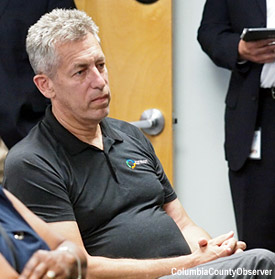Suwannee Valley Electric Co-op Leaps Into the World of High-Speed Internet Provider
Posted July 29, 2022 01:30 pm | Update July 30, 2022
.jpg)
Photo: El Capra via
Pexels | Columbia County
Observer graphic
LIVE OAK, FL - Suwannee Valley Electric Cooperative (SVEC) recognized the handicap that most of its 28,000 consumers face, being on the short side of the digital divide, by not having access to reliable high-speed internet.
.jpg)
SVEC CEO Mike McWaters announces they are in
the broadband business.
On Tuesday morning, SVEC CEO Mike McWaters announced that the electric co-op would be wiring up its infrastructure with fiber cable to provide affordable high-speed internet access to its customers in Hamilton, North Columbia, Suwannee, and Lafayette counties in North Florida.
Background
Attempting to bring high-speed internet service to rural areas in Florida is nothing new.
On August 19, 2009, the newly formed North Florida Broadband Authority (NFBA) applied to the Federal Government for a $30 million grant, funded by Obama Federal Stimulus money. The grant application, hastily put together by Government Services Group (GSG) and the law firm of Nabors, Giblin and Nickerson (NGN) of Tallahassee, should have been used to build a wireless internet network. This network would have served some of Florida's poorest and most educationally challenged households, passing 154,000 households and almost 27,000 businesses.
On February 12, 2010, the National Telecommunications and Information Administration (NTIA), an agency of the Department of Commerce, awarded a $30 mil grant to the NFBA, the group hastily created by Jeff Hendry and the North Florida Economic Development Partnership (NFEDP) in 17 days.
In April 2011, after discovering massive irregularities by GSG and NGN, the Feds closed the spigot on Federal dollars until the NFBA and GSG answered some questions.
Both GSG and NGN were forced to resign from the project, but the die was cast. Eventually, the Feds turned the money spigot back on. The waste and abuse got worse.
After its initial investigation, the Feds and the NTIA went into cover-up mode. With the success of federal grants measured in "how much money one spent" rather than the actual success of a project, all $30 million was squandered.
GSG and NGN’s reach into Florida’s heartland with the NFBA comparable Florida Rural Broadband Authority (FRBA) also ended in disaster. FRBA wasted $24 mil of Obama Broadband stimulus money.
After blowing through $54 million, the NFBA and FRBA ended up with no customers, and every oversight agency in Florida and the Federal Government covered up the disaster. No one was investigated -- no one went to jail, and those needing rural high-speed internet service remained without.
A Better Plan
Beginning in about 2015, folks started looking at America's rural electrical cooperatives as a way to hook up rural customers.
These electrical cooperatives are investor-owned and have boards that their owners elect.
With high visibility announcements and the promise of high-speed internet, co-op members are paying attention. If millions begin going south and promised internet service does not become available, the co-ops and their board members will likely be hearing about it.
.jpg)
The SVEC announcement played to a packed
house. Dignataries from accross N. FL and
beyond attended. In green is State Senator
Loraine Ausley. In the back row (far left)
is State Attorney John Durrett. One row up,
sitting in the tan sports coat is Lafayette
County Commissioner Anthony Adams.
Suwannee Valley Electric Goes All-In: the Cost $93 mil
With an estimated $1.2 billion of rural infrastructure broadband money headed Florida's way, on Tuesday morning, Suwannee Valley Electric took the plunge. It announced that it was going all-in to the high-speed internet provider business.
SVEC hired Conexon to be its consultant. Conexon is an experienced fiber rural co-op consultant, contractor, network builder, and operator.
There were two paths that SVEC could have taken.
The Tri-County Way
SVEC could have gone the Madison County Tri-County Electric Co-op way, which under CEO Julius Hackett chose to give Conexon control of the network.
When your reporter spoke with Mr. Hackett three months ago, Mr. Hackett said the details of the $65 mil Tri-County deal were confidential.
Tri-County serves Jefferson, Madison, Taylor, and Dixie counties.
Tri-County’s $65 mil investment leaves it with owning the fiber infrastructure. Conexon will build the network, be the internet service provider, network operator, call center, and maintenance arm of the network.
Conexon Connect will be the name of Tri-State’s $65 mil network, which Conexon will own.
Tri-County’s cost to build out the network is $27,000 a mile.
The SVEC Approach
.jpg)
It was standing room only as folks
overflowed into the hallway. Standing on the
left is Suwannee River Water Management
District Exec. Director Hugh Thomas. He told
your reporter after the event that he was
excited for the rural folks who will finally
be able to have high speed internet.
SVEC contracted with Conexon to be its consultant and build out the network at a projected cost of $93 mil or $22,000 a mile. It did not contract with Conexon to be its internet service provider.
SVEC formed a separate limited liability corporation (LLC) called RapidFiber, which will be its internet service provider (ISP), a task that will be under the operation and control of SVEC.
RapidFiber will be a subsidiary of SVEC.
SVEC Director of Communications Jon Little and CFO Christine Moor spoke with your reporter yesterday. Ms. Moor explained the SVEC-RapidFiber connection.
“SVEC is the one investing in the infrastructure, and we will own that. That could make SVEC eligible for potential FEMA funding because we are a private nonprofit."
Your reporter pointed out that, unlike buried fiber, SVEC’s fiber assets will be hanging up in the air along with its electric transmission wires. Hurricanes are a problem.
Ms. Moor added, “We would want to be able to recover reimbursement should that infrastructure be damaged during hurricanes, and with a for-profit subsidiary, we would not have an opportunity to do that.”
SVEC’s fiber system will be able to provide phone and television. Your reporter asked if SVEC was considering that.
Ms. Moor said, “We are committed to internet; we have not decided on voice. I don’t think there has been any discussion about TV service.”
Maintaining and repairing the fiber on the utility poles is another issue that SVEC is facing. Who works on the poles and the fiber?
The National Electrical Safety Code (NESC) establishes clearances on utility poles for electric transmission, connections, telecommunications, etc. See: NESC clearances are a matter of fact...
SVEC has not yet come up with a plan for this. Increasing the skill set of its crews is an option, as is the use of private contractors.
Your reporter pointed out that during an outage in a hurricane, when a pole goes down, the fiber may well go down with it.
Electric co-ops do field maintenance both ways, with some cross-training their crews in fiber.
Ms. Moor said, “I don't know that we discussed exactly who it will be, but it could be a contractor, or our own crews could have the ability to do so.”
This decision is down the road, as is the project financing.
Ms. Moor explained, “We have the challenge of financing this project.”
Mr. Little added, “We’re trying to figure out what grants are available.”
Ms. Moor said that SVEC is speaking with everyone they can think of.

![]() Former
FCC member and Conexon partner Jonathan
Chambers listens before making his
presentation.
Mr. Chamber's presentation is
here. (download or listen)
Former
FCC member and Conexon partner Jonathan
Chambers listens before making his
presentation.
Mr. Chamber's presentation is
here. (download or listen)
During the meeting, Conexon partner Jonathan Chambers said the charge for 100 megabit service (up and down) would be $49.95.
This reporter's office is in the woods in Florida. This morning, Windstream DSL, which works fine for me, was 32 megabits down and two megabits up. The charge for this service is $48.
In researching other co-op fiber endeavors, the SVEC staff should be planning to work some long hours.
Their demonstrated transparency should gain them support from their owner-customers and get them through the inevitable bumps in the road.
Epilogue
Yesterday evening your reporter spoke with Lafayette County Commissioner Anthony Adams, who also attended the Tuesday SVEC announcement.
Commissioner Adams has been working in private agriculture industry and traveling throughout the South for the past twenty-five years.
He said, “I think SVEC is on the right track. Considering what went on in Florida with its past attempt at a rural broadband rollout, SVEC’s decision to be the network provider with its RapidFiber subsidiary is the right choice.”

